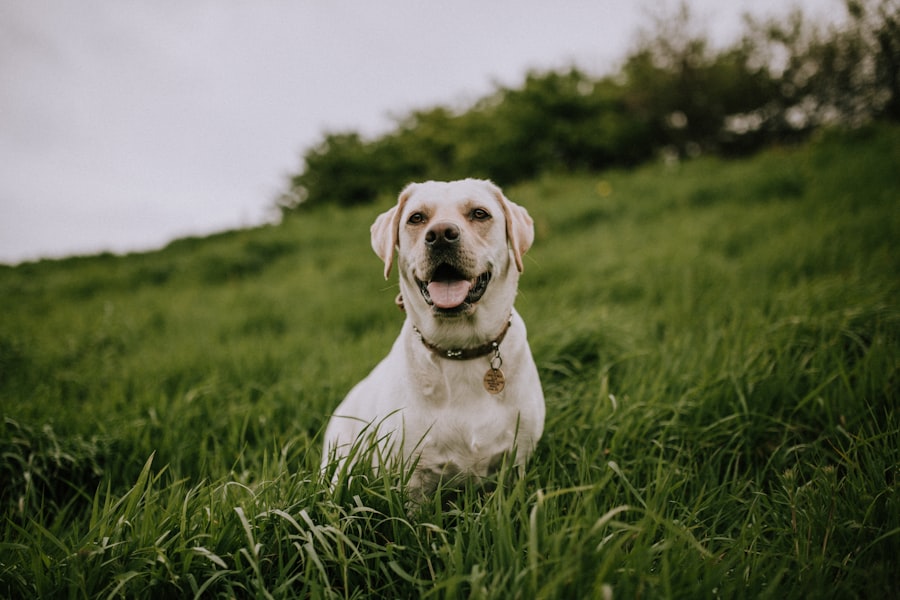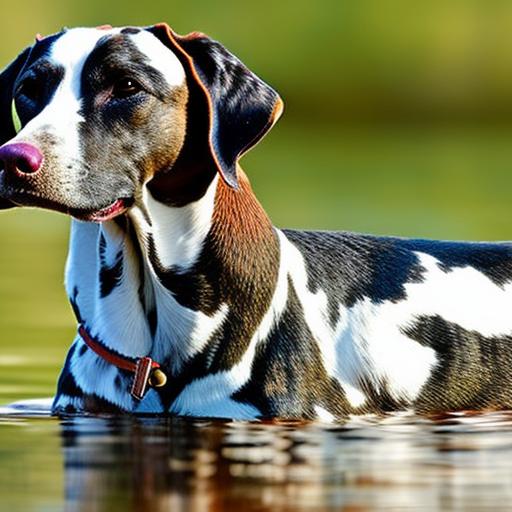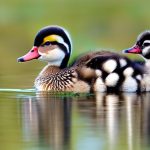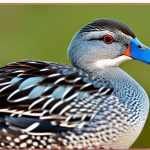Duck hunting is a popular sport enjoyed by many outdoor enthusiasts. It requires skill, patience, and the right equipment to be successful. One important aspect of duck hunting is having a good duck dog by your side. A well-trained and reliable duck dog can greatly enhance your hunting experience and increase your chances of success. In this article, we will explore the role of a duck dog in hunting, the characteristics of a good duck dog breed, training techniques, popular duck dog breeds to consider, health and care considerations, the importance of socialization, hunting ethics and responsible ownership, and tips for bonding with your duck dog.
Key Takeaways
- A duck dog is a hunting dog that specializes in retrieving ducks and other waterfowl.
- Good duck dog breeds have certain characteristics such as a strong work ethic, intelligence, and a love for water.
- Retrieving skills are essential for a duck dog, including the ability to swim, retrieve, and follow commands.
- Training a duck dog requires patience, consistency, and positive reinforcement techniques.
- Popular duck dog breeds include Labrador Retrievers, Golden Retrievers, and Chesapeake Bay Retrievers.
- When choosing a breed, consider your hunting needs and the dog’s temperament and energy level.
- Health and care considerations for duck dogs include regular exercise, grooming, and vaccinations.
- Socialization is important for duck dogs to prevent aggression and anxiety.
- Hunting ethics and responsible ownership involve proper training, care, and respect for wildlife.
- Building a strong relationship with your duck dog involves spending time together, training, and positive reinforcement.
Understanding the Role of a Duck Dog
A duck dog plays a crucial role in duck hunting. They are trained to retrieve downed ducks from the water or land, making it easier for hunters to collect their game. A good duck dog is not only skilled at retrieving but also possesses other important qualities such as obedience, endurance, and a strong work ethic.
There are different types of duck dogs that serve specific roles in hunting. The most common type is the retriever, which is bred specifically for retrieving game. These dogs have a natural instinct to retrieve and are highly trainable. Other types of duck dogs include flushing dogs, which are used to flush out ducks from hiding spots, and pointing dogs, which are trained to locate and point out ducks for the hunter.
Characteristics of a Good Duck Dog Breed
When choosing a breed for a duck dog, there are certain traits to look for that make them well-suited for the job. Some important characteristics include intelligence, trainability, endurance, and a strong retrieving instinct. A good duck dog breed should also have a water-resistant coat and webbed feet to aid in swimming.
Some popular duck dog breeds include Labrador Retrievers, Golden Retrievers, Chesapeake Bay Retrievers, and German Shorthaired Pointers. Labrador Retrievers are one of the most popular choices for duck hunting due to their intelligence, trainability, and natural retrieving instincts. Golden Retrievers are also highly regarded for their retrieving abilities and friendly temperament. Chesapeake Bay Retrievers are known for their endurance and ability to handle cold water conditions. German Shorthaired Pointers are versatile hunting dogs that excel in both pointing and retrieving.
Retrieving Skills in Duck Dogs
Retrieving skills are crucial for a duck dog as they are responsible for retrieving downed ducks from the water or land. A well-trained duck dog should have a strong desire to retrieve, good marking ability, and the ability to follow hand signals and verbal commands.
To improve your duck dog’s retrieving skills, it is important to start training at a young age. Begin by introducing them to retrieving objects such as bumpers or dummies. Use positive reinforcement techniques such as treats and praise to reward them for successful retrieves. Gradually increase the difficulty by throwing the object into water or longer distances.
Consistency is key when training a duck dog. Practice retrieving exercises regularly and gradually increase the difficulty as your dog progresses. It is also important to expose your dog to different hunting scenarios such as hunting in different types of terrain and weather conditions.
Training a Duck Dog: Tips and Techniques
Training a duck dog requires time, patience, and consistency. The training process can be broken down into several stages including basic obedience training, retrieving training, and advanced hunting training.
Start by teaching your duck dog basic obedience commands such as sit, stay, come, and heel. These commands will form the foundation for more advanced training later on. Use positive reinforcement techniques such as treats and praise to reward your dog for obeying commands.
Once your dog has mastered basic obedience, you can begin retrieving training. Start with simple retrieves in a controlled environment such as a backyard or training field. Gradually increase the difficulty by introducing distractions and different types of terrain. Use hand signals and verbal commands to direct your dog to the retrieve.
Advanced hunting training involves simulating real hunting scenarios. This includes training your dog to retrieve ducks from water, land, and dense cover. It also involves teaching your dog to follow hand signals and verbal commands to locate and retrieve downed ducks.
Popular Duck Dog Breeds to Consider

There are several popular duck dog breeds to consider when choosing a dog for duck hunting. Each breed has its own unique characteristics and strengths.
Labrador Retrievers are one of the most popular choices for duck hunting due to their intelligence, trainability, and natural retrieving instincts. They are known for their friendly temperament and ability to work well with other dogs.
Golden Retrievers are also highly regarded for their retrieving abilities and friendly temperament. They are known for their patience, loyalty, and eagerness to please their owners.
Chesapeake Bay Retrievers are known for their endurance and ability to handle cold water conditions. They have a thick, water-resistant coat that helps protect them from the elements.
German Shorthaired Pointers are versatile hunting dogs that excel in both pointing and retrieving. They have a strong prey drive and are known for their intelligence and trainability.
Choosing the Right Breed for Your Hunting Needs
When choosing a duck dog breed, it is important to consider your specific hunting needs and preferences. Factors to consider include the type of terrain you will be hunting in, the weather conditions you will be facing, and the type of game you will be hunting.
Labrador Retrievers are a versatile breed that can adapt well to different hunting conditions. They are well-suited for both waterfowl and upland game hunting.
Golden Retrievers are also versatile hunting dogs that excel in waterfowl hunting. They have a gentle temperament and are known for their ability to work well with other dogs.
Chesapeake Bay Retrievers are well-suited for hunting in cold water conditions. They have a thick, water-resistant coat and a strong work ethic.
German Shorthaired Pointers are versatile hunting dogs that excel in both pointing and retrieving. They are well-suited for upland game hunting and can also be trained for waterfowl hunting.
Health and Care Considerations for Duck Dogs
Keeping your duck dog healthy and happy is essential for their overall well-being and performance in the field. Regular veterinary check-ups, vaccinations, and preventative care such as flea and tick control are important for maintaining your dog’s health.
Proper nutrition is also crucial for a duck dog’s health and energy levels. Feed them a balanced diet that is appropriate for their age, size, and activity level. Provide fresh water at all times, especially during hunting trips to keep them hydrated.
Regular exercise is important for a duck dog’s physical and mental well-being. Provide them with plenty of opportunities to run, swim, and play. Mental stimulation through training exercises and interactive toys can also help keep them mentally sharp.
The Importance of Socialization for Duck Dogs
Socialization is an important aspect of raising a well-rounded duck dog. It involves exposing your dog to different people, animals, environments, and situations to help them develop good social skills and confidence.
Start socializing your duck dog at a young age by introducing them to new experiences in a positive and controlled manner. Take them on walks in different environments, introduce them to other dogs and animals, and expose them to different sights, sounds, and smells.
Positive reinforcement techniques such as treats and praise can be used to reward your dog for calm and appropriate behavior during socialization exercises. Gradually increase the difficulty of the socialization exercises as your dog becomes more comfortable and confident.
Hunting Ethics and Responsible Ownership of a Duck Dog
Hunting ethics are an important aspect of responsible ownership of a duck dog. It is important to hunt ethically and responsibly to ensure the well-being of the game and the environment.
Responsible ownership of a duck dog involves proper training, care, and handling of your dog. This includes providing them with proper nutrition, veterinary care, exercise, and socialization. It also involves following hunting regulations and laws, respecting private property rights, and practicing good sportsmanship.
Bonding with Your Duck Dog: Building a Strong Relationship
Building a strong bond with your duck dog is important for a successful hunting partnership. Spend quality time with your dog both in and out of the field. Engage in activities that you both enjoy such as training exercises, playtime, and walks.
Use positive reinforcement techniques such as treats, praise, and affection to reward your dog for good behavior. Be patient and consistent in your training efforts and avoid harsh punishment or negative reinforcement.
A well-trained and reliable duck dog can greatly enhance your duck hunting experience. They play a crucial role in retrieving downed ducks and are valuable companions in the field. When choosing a duck dog breed, consider their characteristics, trainability, and suitability for your specific hunting needs. Train your duck dog using positive reinforcement techniques and provide them with proper care, socialization, and exercise. Practice responsible ownership by following hunting ethics and building a strong bond with your duck dog. With the right breed and training, you can enjoy many successful hunts with your loyal companion by your side.
If you’re interested in learning about good duck dog breeds, you might also find our article on “What Vegetables Do Quails Eat?” quite informative. Quails are small game birds that share some similarities with ducks, and understanding their dietary preferences can provide valuable insights into the nutritional needs of ducks. To read more about this topic, click here.
FAQs
What are some good duck dog breeds?
Some good duck dog breeds include Labrador Retriever, Golden Retriever, Chesapeake Bay Retriever, and English Springer Spaniel.
What makes a good duck dog breed?
A good duck dog breed should have a strong retrieving instinct, be able to swim well, have a good nose, and be trainable.
What is the role of a duck dog?
The role of a duck dog is to retrieve ducks that have been shot by hunters. They are trained to swim in cold water, retrieve ducks from difficult locations, and bring them back to their owner.
What are some characteristics of a good duck dog?
Some characteristics of a good duck dog include being obedient, having a strong work ethic, being able to work in cold water, and having a good nose.
Can any dog be trained to be a duck dog?
While any dog can be trained to retrieve ducks, some breeds are better suited for the job due to their natural instincts and abilities. It is important to choose a breed that is well-suited for the task at hand.
What kind of training do duck dogs need?
Duck dogs need to be trained in obedience, retrieving, and swimming. They also need to be trained to work in cold water and to retrieve ducks from difficult locations. Consistent training is key to developing a successful duck dog.
Meet Walter, the feathered-friend fanatic of Florida! Nestled in the sunshine state, Walter struts through life with his feathered companions, clucking his way to happiness. With a coop that’s fancier than a five-star hotel, he’s the Don Juan of the chicken world. When he’s not teaching his hens to do the cha-cha, you’ll find him in a heated debate with his prized rooster, Sir Clucks-a-Lot. Walter’s poultry passion is no yolk; he’s the sunny-side-up guy you never knew you needed in your flock of friends!







